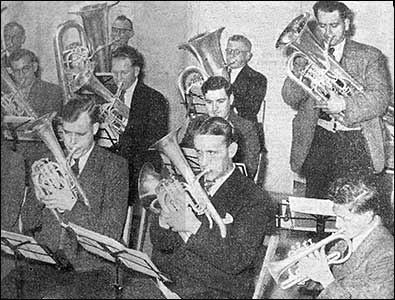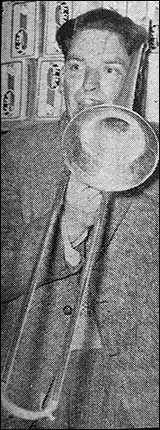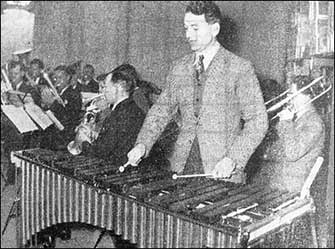The Rushden Echo and Argus, 27th November, 1953, transcribed by Jim Hollis
Come listen to the band – and what a band it will be! First Concert in January
Stepping into a Rushden Warehouse (writes L.V.E.), I thought of getting a story about the birth of a band. The notion fell through as soon as the music began – the infancy theme became an absurdity.
There will, of course, be lots of nursing before the John White Footwear Band rises to its potential, but when the players settle down to their first full practice the idea of mewling and puking was blown to shreds.
The men who strolled into the Lime Street stockroom and settled themselves casually into a clearance among shoe boxes had been brought together from many parts of the country, and even from the high seas.
 |
|
Fresh from a championship win with Foden’s. David Morris (standing, right), one of the best euphonium players in the
country, goes through a solo.
|
They were ready-made instrumentalists – not all celebrities of the brass band world, yet all picked for expertness or promise.
Progress as a team had been taken for granted. The first concert (in January) had been announced, and contesting for the highest prizes was a plan for the near future.
Far from casual
Beaming cheerfully, but far from casual, was musical director George Thompson, who darted from point to point settling details.
He is left-handed, impetuous and fleet of foot, has taken second prize (with Hanwell) in the National Championship, and built a good band for Odhams Press from novices.
Beginning with a baton plunge which could only be read as a general signal to attack, the practice took shape as an introduction of soloists and an exercise in sight-reading.
Great spirit
 |
|
Maxwell Thornton
leading trombonist
|
A short work was played with great spirit and with stresses so eager that they tended to spill over. The men had never seen it before.
The soloists played works which, in the main, they reeled off from memory.
In each case, however, the band was accompanying for the first time. When stops were made the only points at issue were balance or when to use a mute.
In the drummer’s corner were tympani and a gleaming xylophone, which was pushed into the foreground for a performance by Jack Miles (fresh from the Royal Yacht Band), whose deportment, equally to his skill, must make him a concert favourite.
Easy for James
Tall and slim, James Scott (late M. and F.) produced “Carnival of Venice” from a cornet that seemed to droop almost carelessly.
David Morris, who a few weeks ago was helping Fodens to take the championship, stood up to play Senaille’s “Introduction and Allegro Spiritoso” on his euphonium, and Maxwell Thornton, a second M. and F. star, showed that a Mozart horn concerto can come out well on the trombone.
The band enjoyed itself in a fanfare with a modern tang (composer: George Thompson), lingered quite a while on “Crimond,” and finished the evening at grips with Liszt’s Hungarian Rhapsody No. 2
Mr. Thompson, with coat off and head forward, had things to say about the first phase of the rhapsody, but in the fast movement you could feel that the players did not want to stop, and Mr. Thompson gave them their head.
 |
|
Royal Marine 12 years, drummer-xylophonist Jack Miles
|
Stayed an hour
Mr. John White, the founder, came in for “a few minutes,” stayed an hour or more, and then hurried off because he was overdue at home.
His well-favoured band starts on an executive plane that many have not reached in years of effort.
What happens from that point remains to be seen, but with M. and F. and Rushden Temperance taking note and all the British brass hand world attentive, we can certainly mark East Northants as a hot spot of “banding.”
The new band contains a father and his son, Archie and James Scott. One of the bass players remembers visiting Rushden with Callenders well over twenty years ago.
|